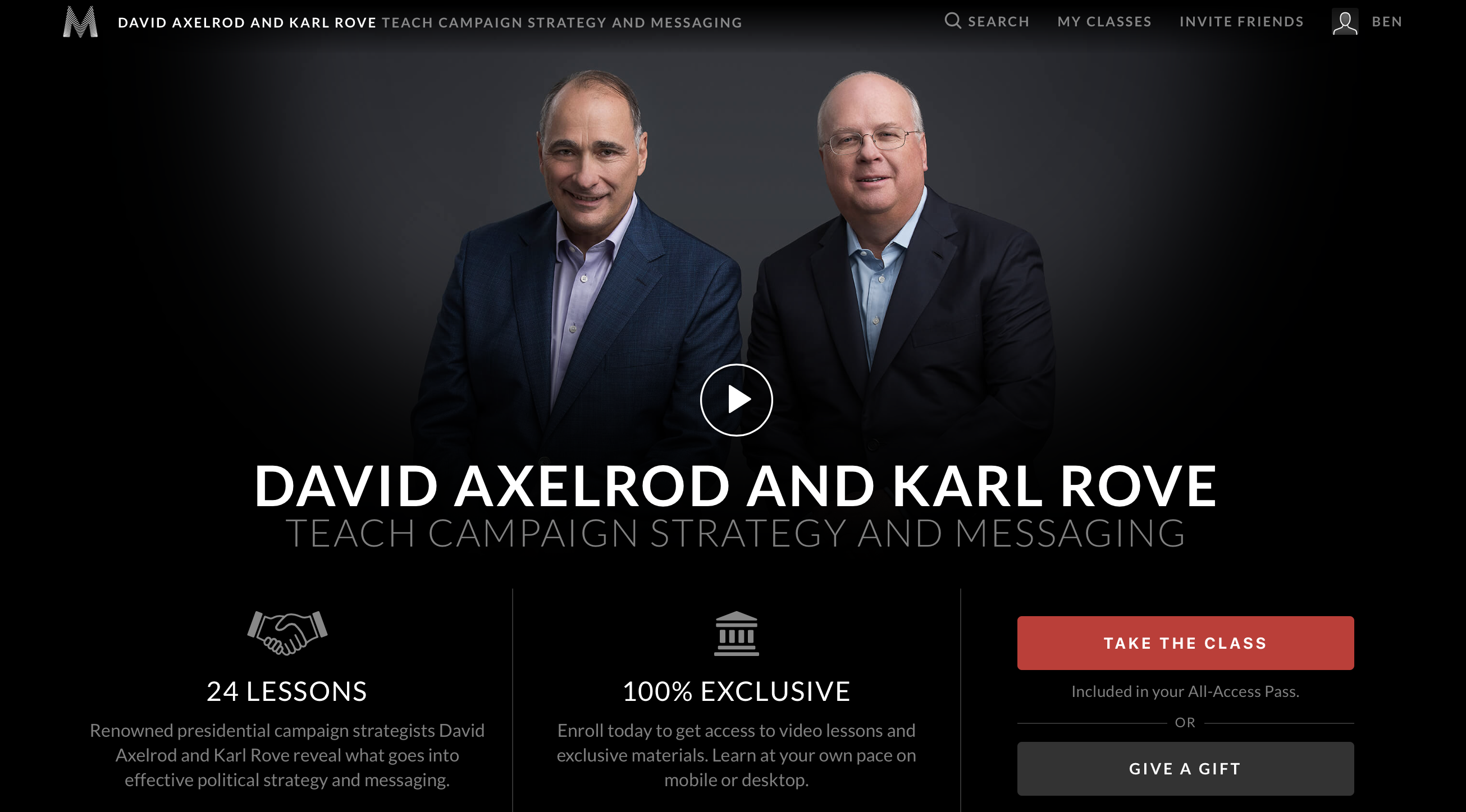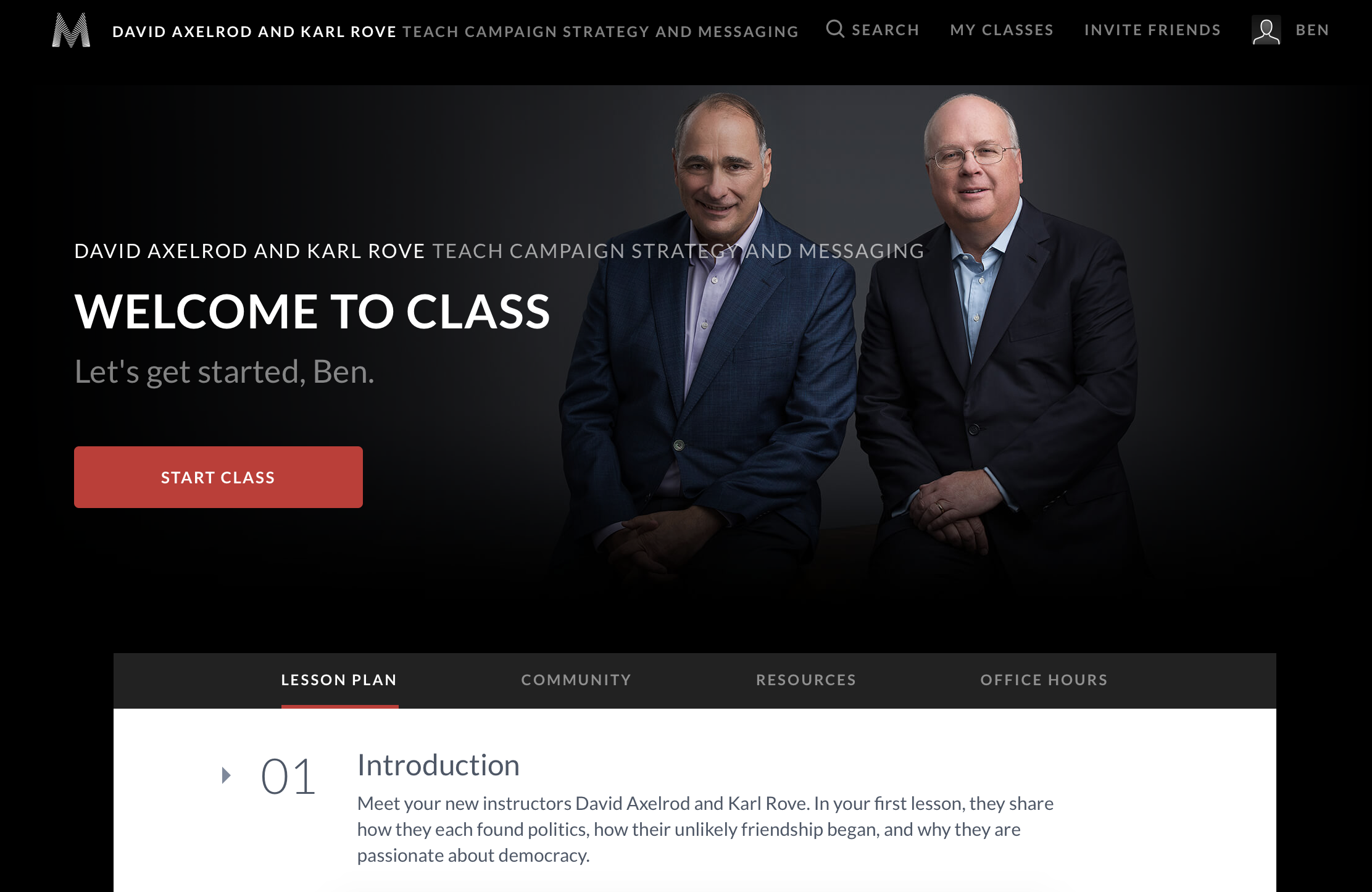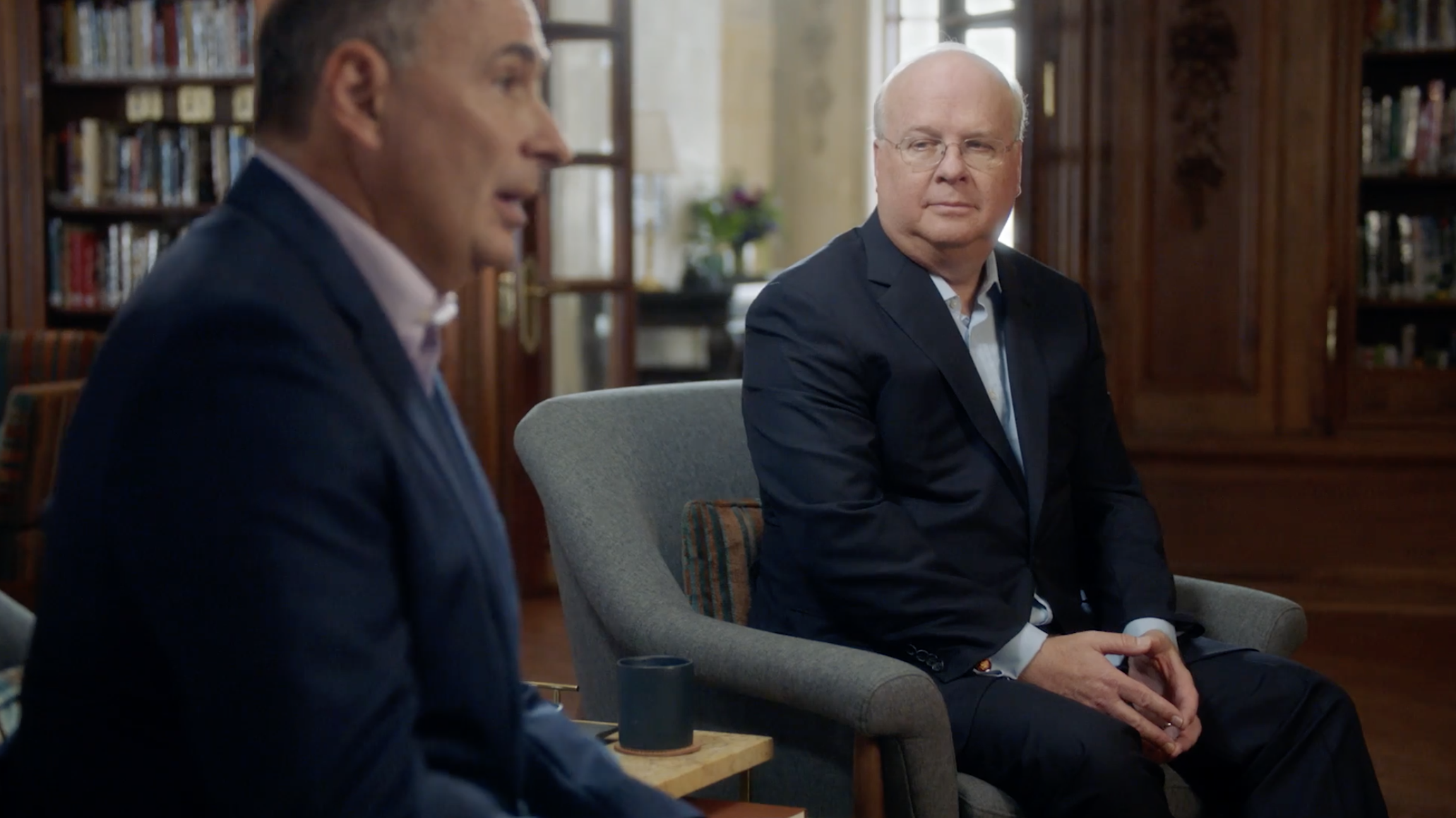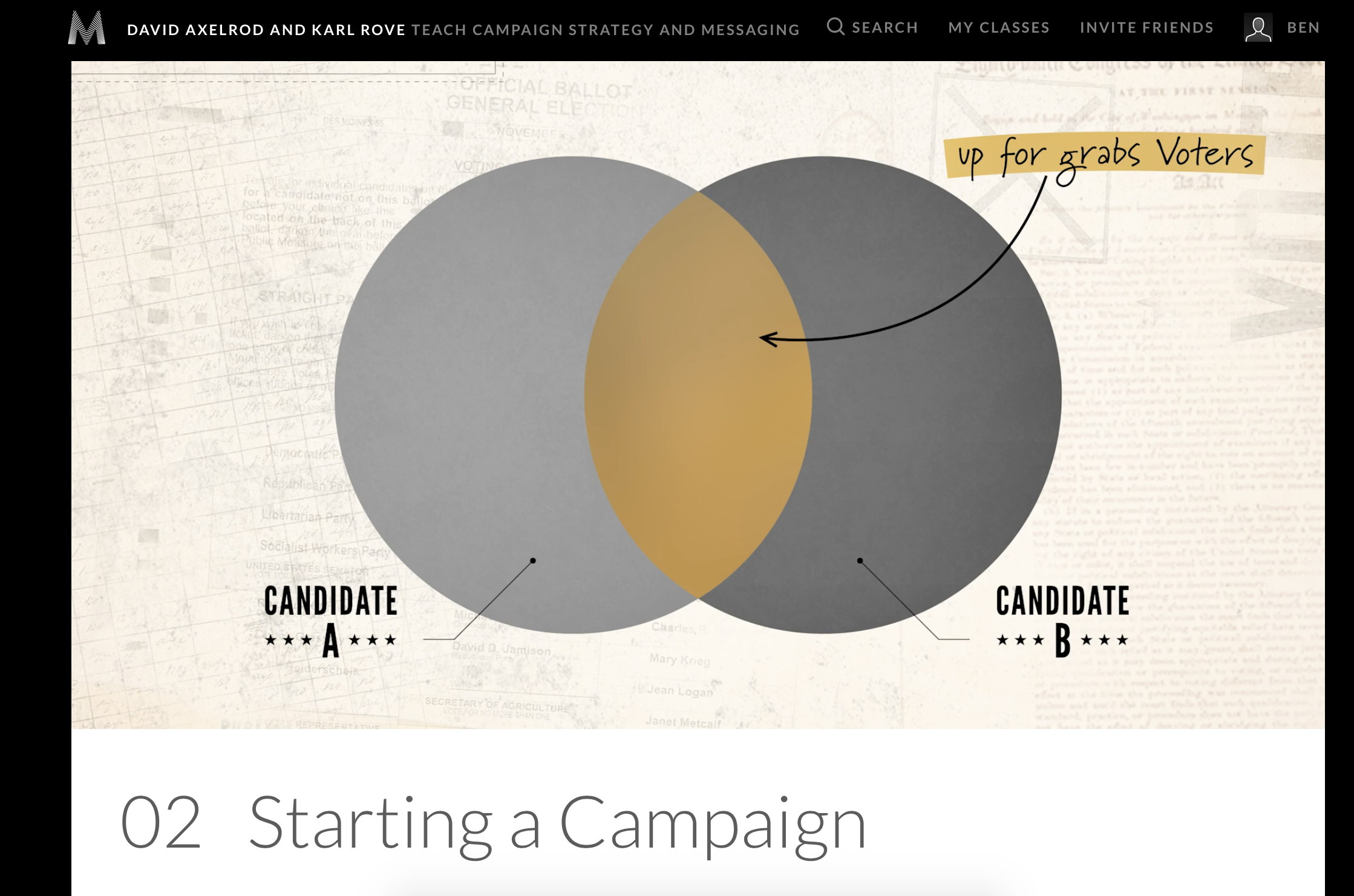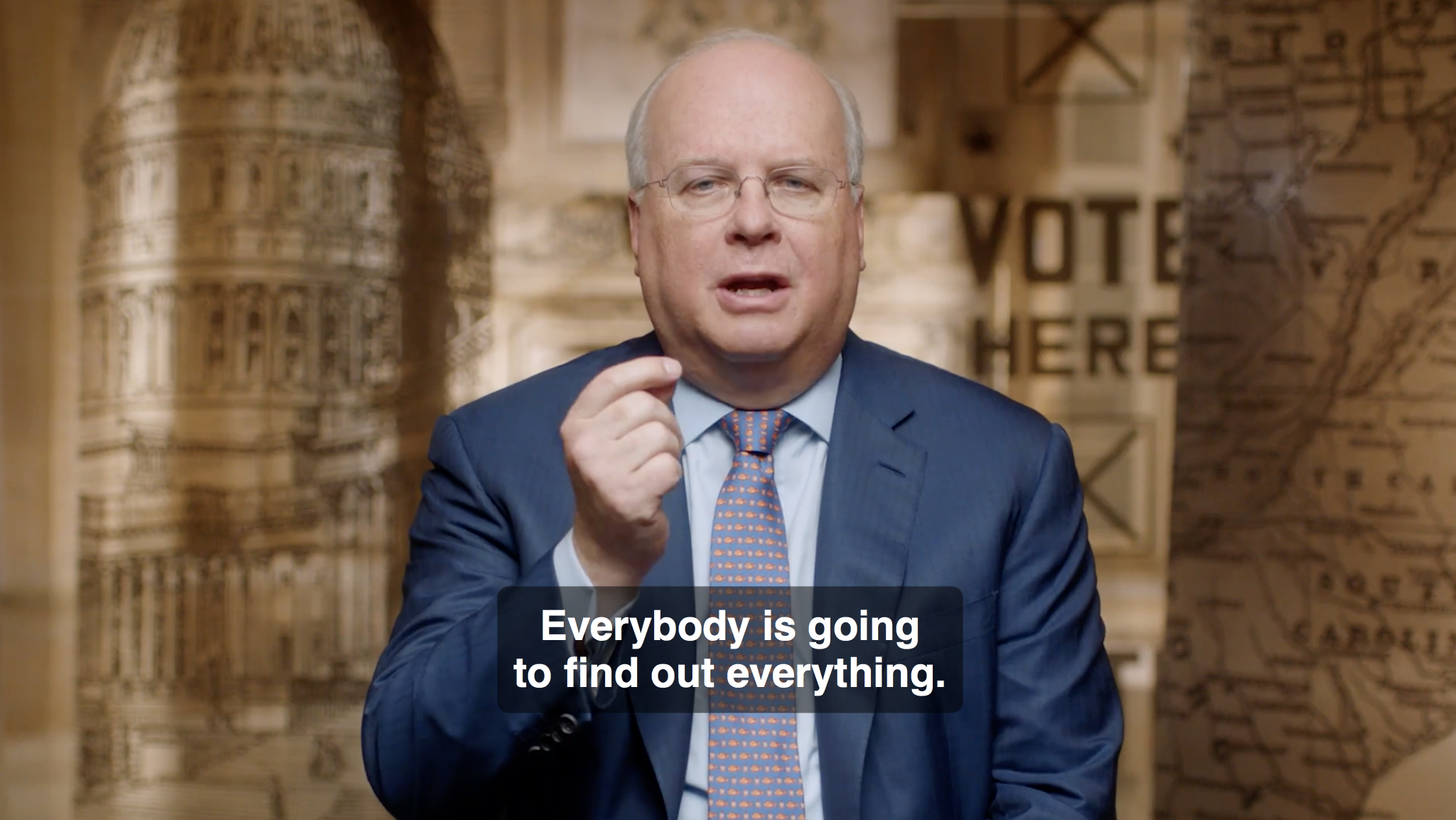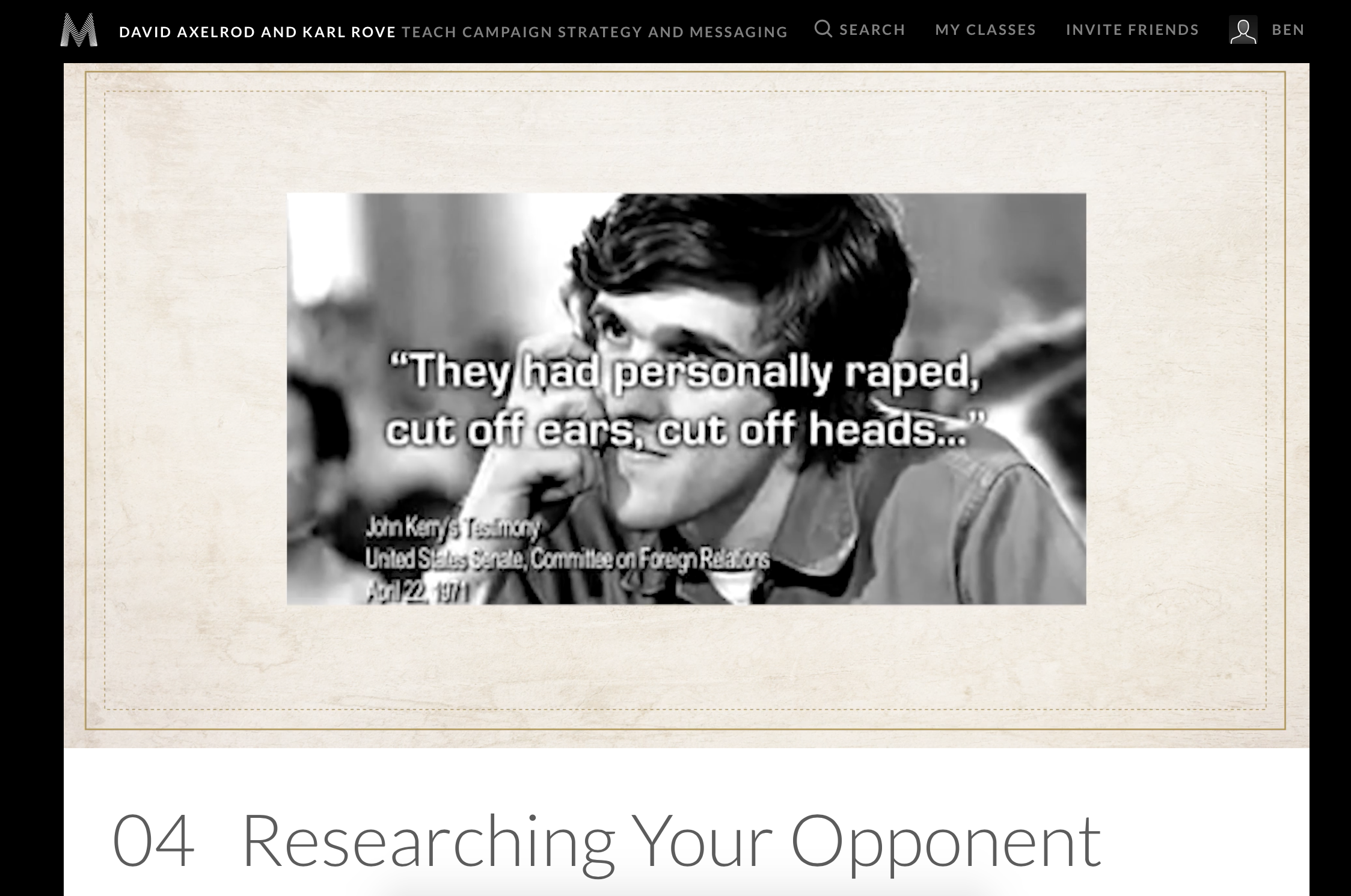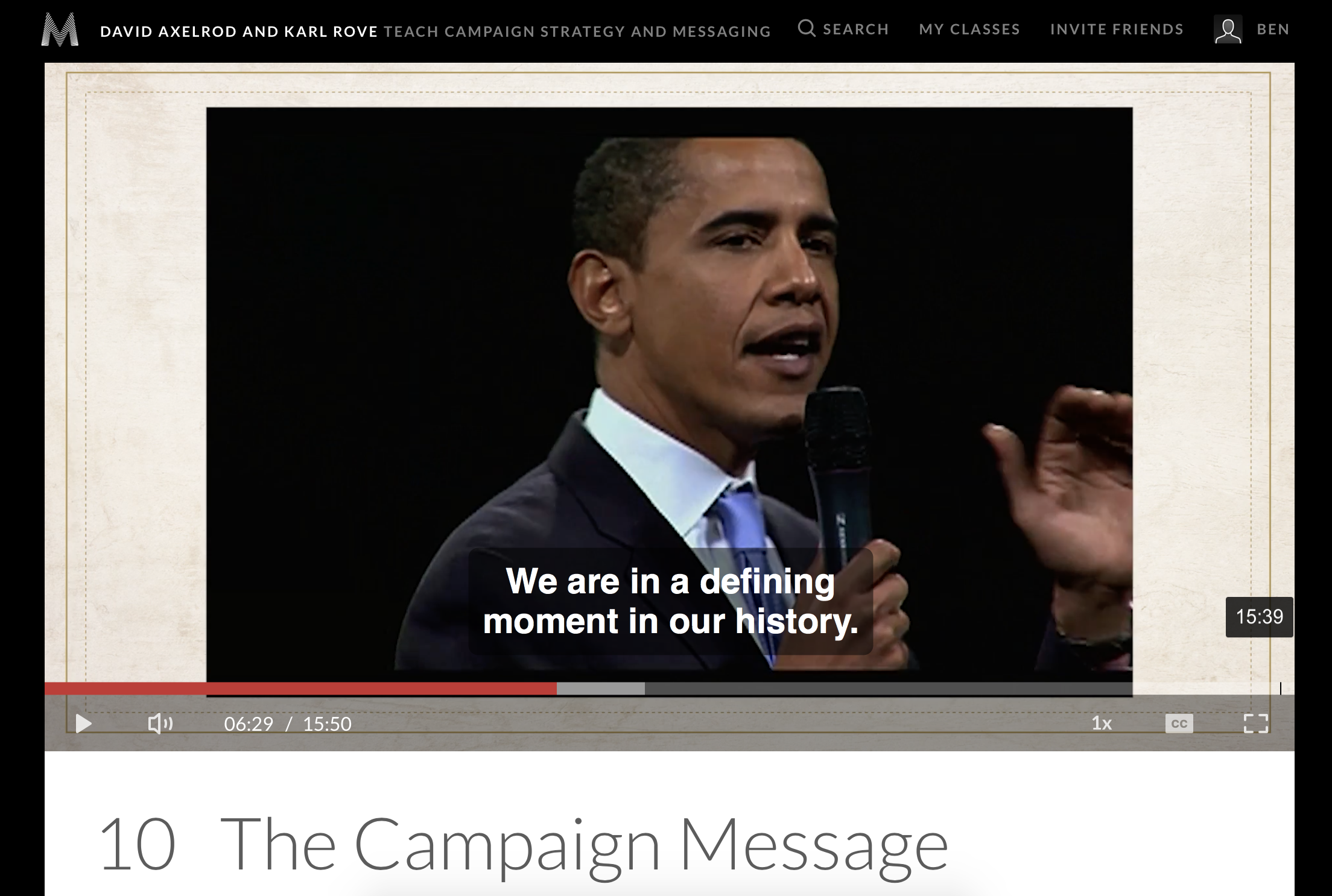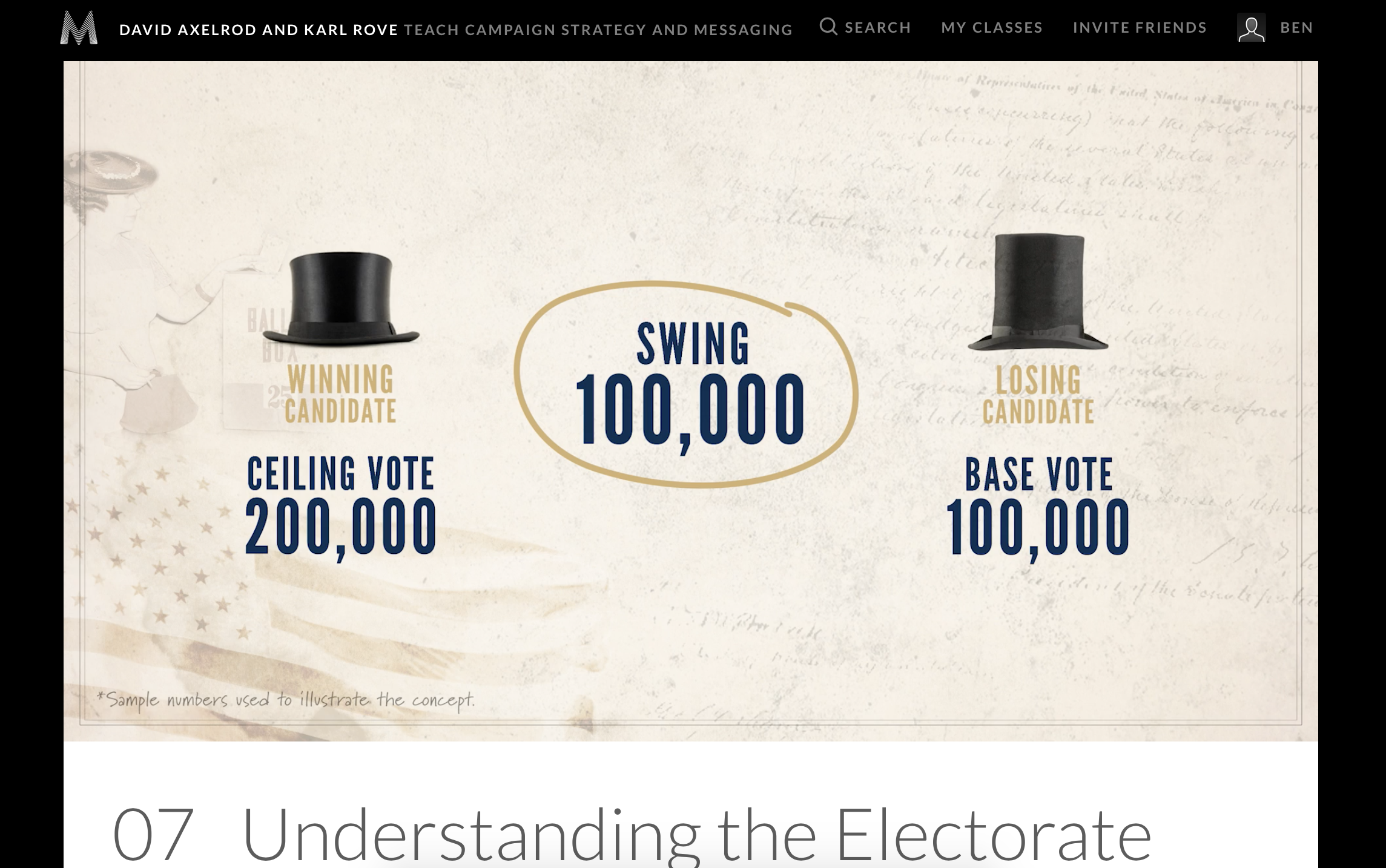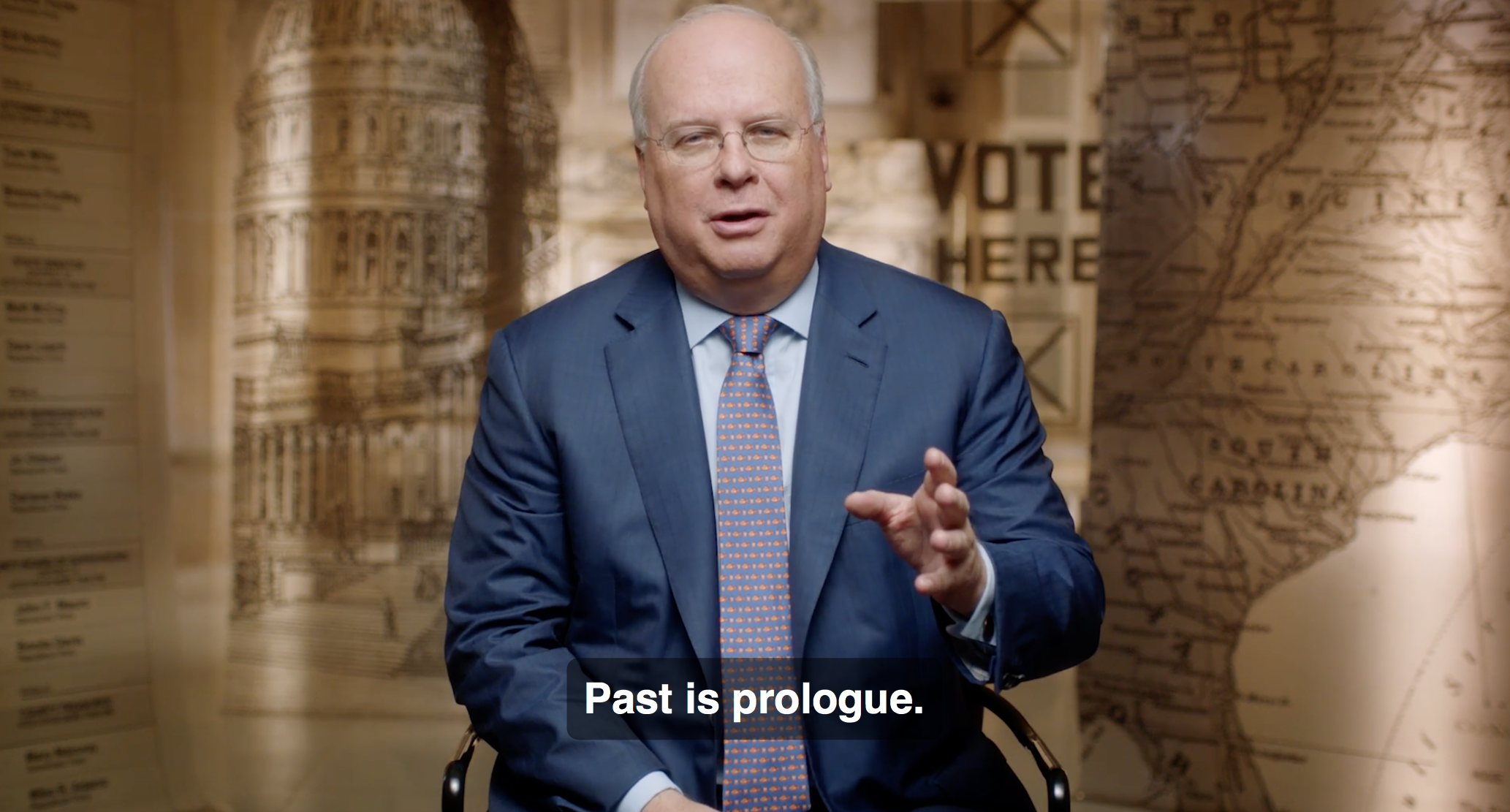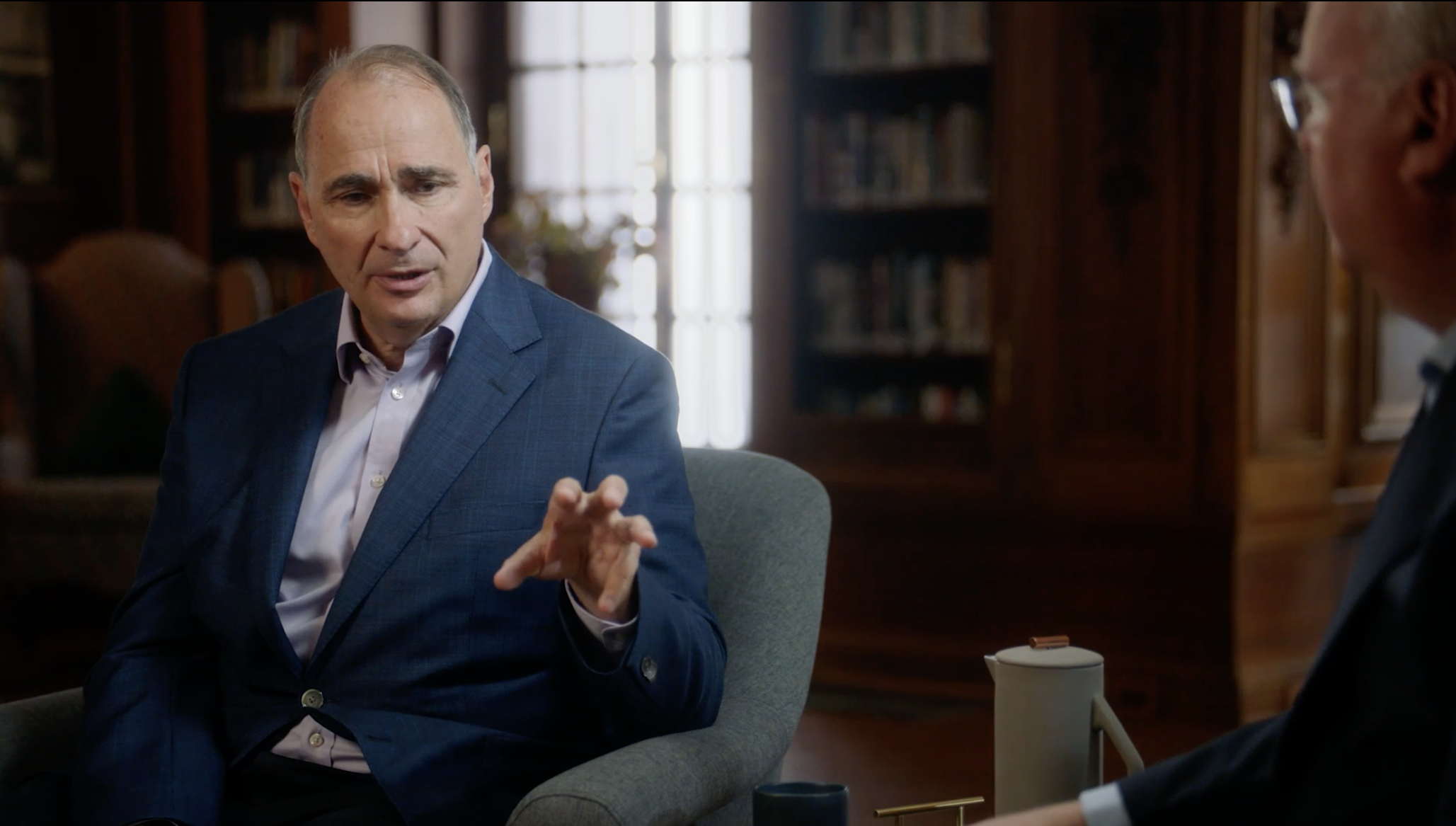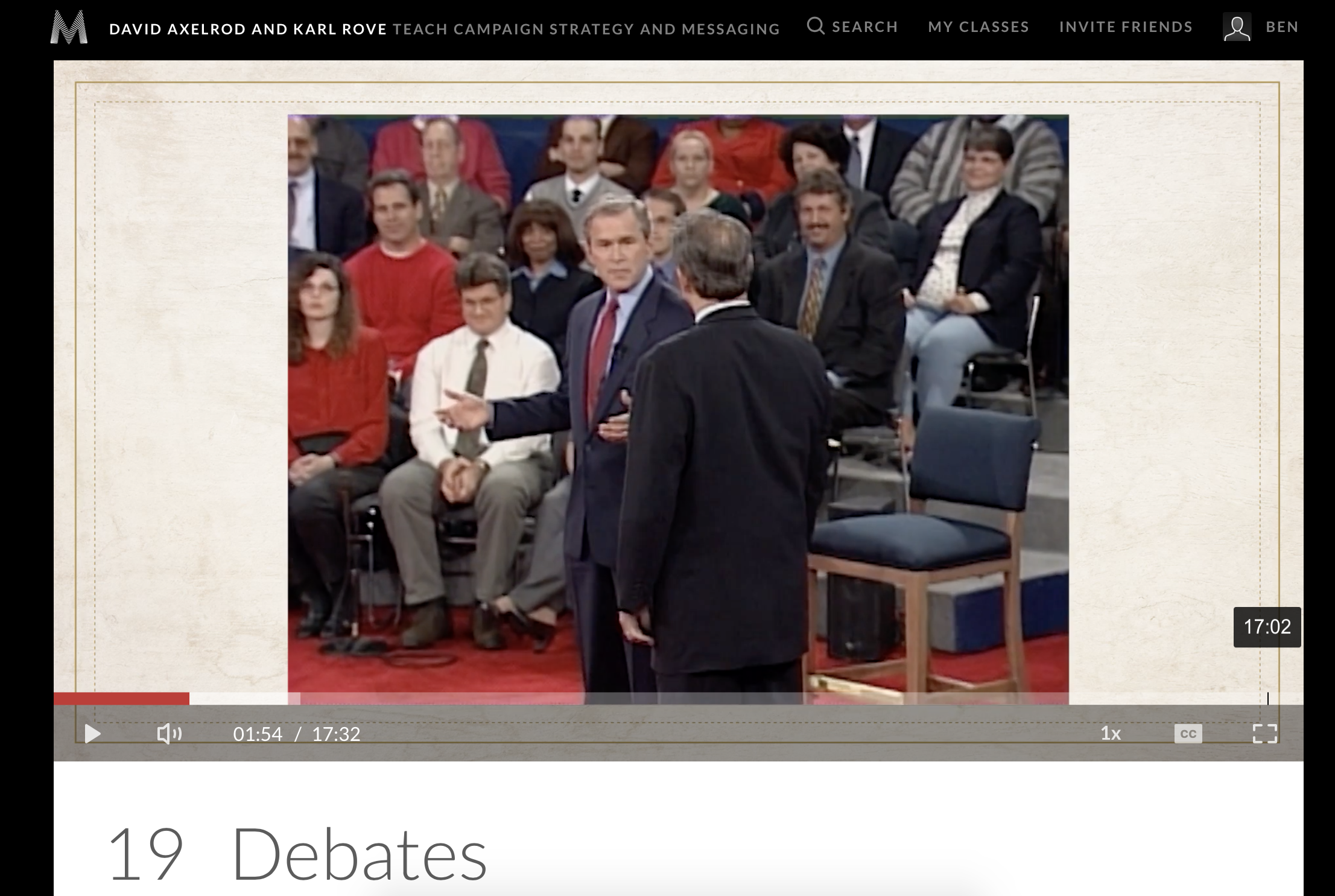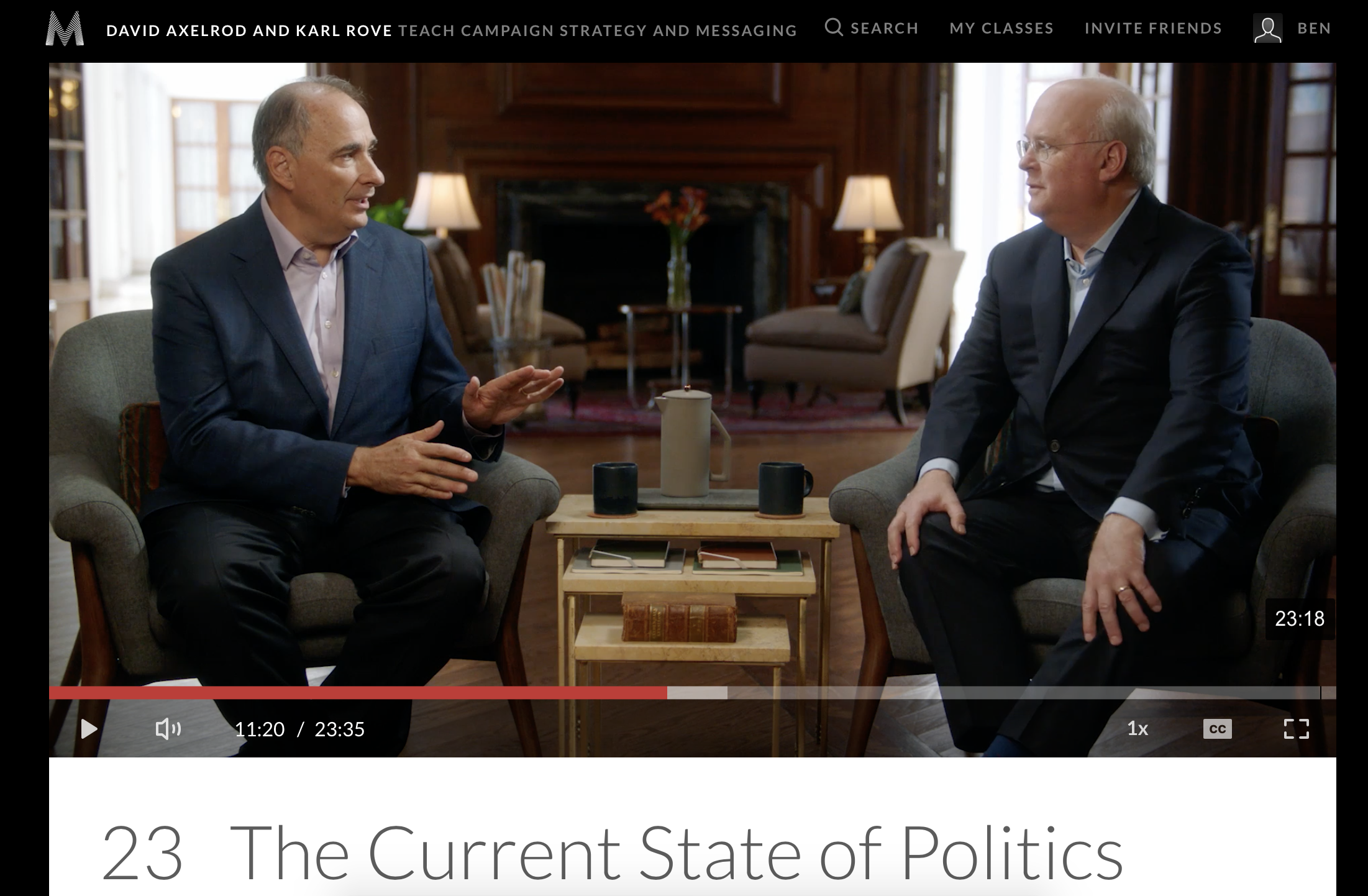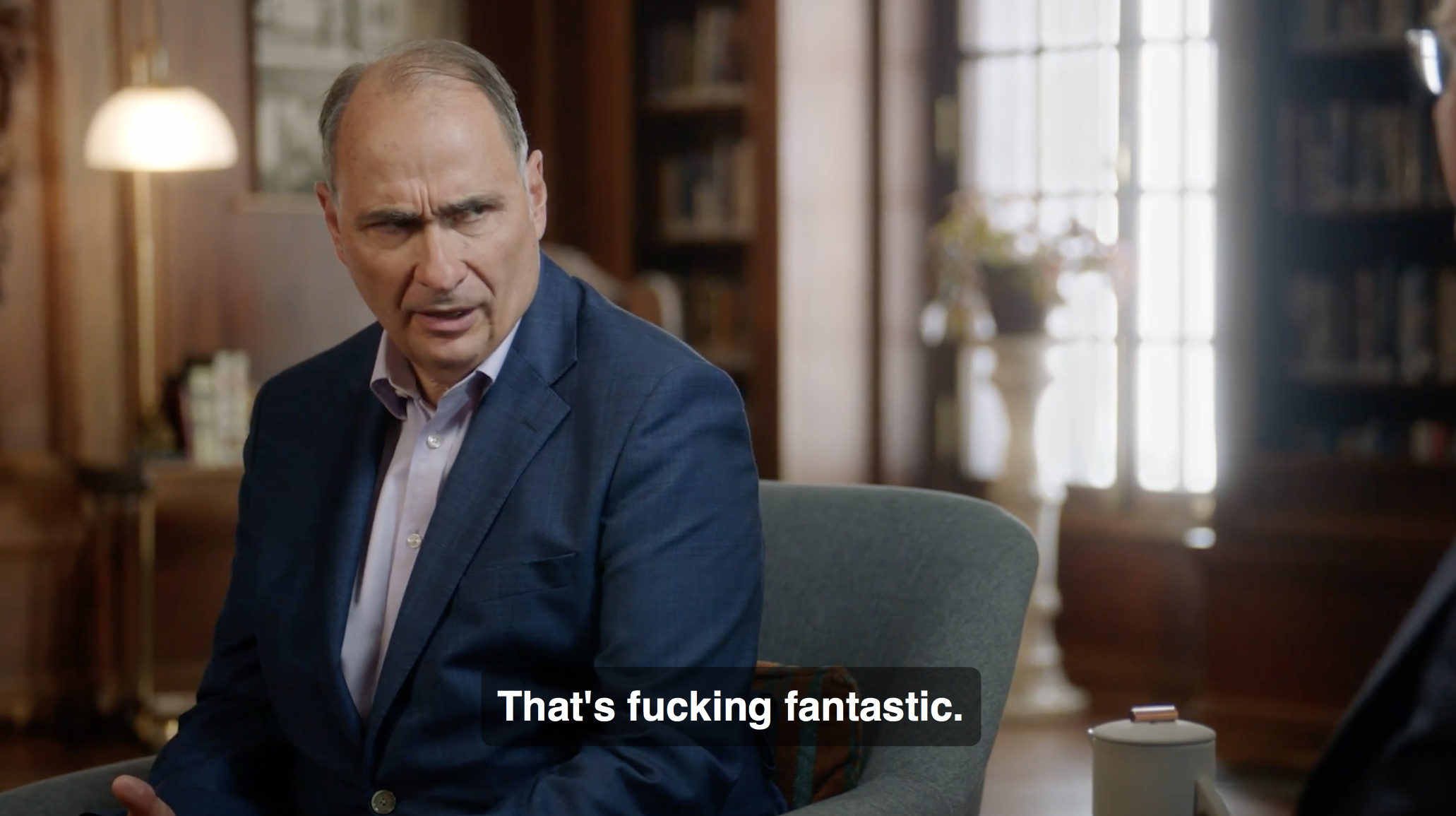Just one lesson in and the David Axelrod & Karl Rove Teach Campaign Strategy MasterClass was already shaping up to be one of the best MasterClasses I’ve ever taken.
My All Access Pass is easily the best investment I’ve made when it comes to online education. The fact that it allows me to access the entire MasterClass catalogue means I’ve enrolled in classes I never would have otherwise or paid for singly. And many of those classes ended up being among my favourites.
Chris Hadfield, Jane Goodall, Garry Kasparov, and Ken Burns were all among my favourite MasterClass instructors – and now so are David Axelrod and Karl Rove – and all of them I had the privilege to learn from thanks to my All Access Pass.
But why am I loving the David Axelrod and Karl Rove Teach Campaign Strategy MasterClass so much?
David Axelrod & Karl Rove Teach Campaign Strategy & Messaging MasterClass Review
Firstly, the thing I love most about this MasterClass is the fact that what seems like a niche subject is endlessly applicable to so many different areas.
- Maybe you aspire to hold office.
- Maybe you want to work on campaigns.
- Or maybe you just want to know more about the political system to be a better citizen.
Whatever camp you fall into, this MasterClass definitely has you covered.
If you’re aspiring to hold office (doesn’t have to be presidential, could be for city council or even school board), you should treat this MasterClass like a candidate bootcamp.
If you’re contemplating a career in political campaigns, you’ll have a good idea what area your skills and temperament will best lend themselves to by the end of this MasterClass.
And if you just want to learn more about the political system and understand more of what went on behind the scenes of recent elections, you’ll definitely get that from this MasterClass too.
What you get in the David Axelrod & Karl Rove Teach Campaign Strategy & Messaging MasterClass
You currently get 24 video modules with 5+ hours of content plus a workbook that’s structured tightly to cover every facet of campaign strategy and messaging, covering topics such as:
- Debates
- Slogans and logos
- Public appearances
- The campaign message
- Harnessing social media
- Getting your message out
- Budgeting and fundraising
- Researching your opponent
And so much more.
I’ve gone through about half of the course so far and every lesson has been incredibly eye-opening and compulsively watchable.
You know this is going to be a phenomenal MasterClass right from the start when it kicks off with an exhilarating opening in which we learn where David Axelrod and Karl Rove got their first footholds in politics and how their unlikely friendship began.
The elephant in the room is addressed immediately.
We tend to demonise those on the other side because we don’t know them, but Karl thinks it’s strange that people think it’s strange that they’re friends.
Even though I think his ideas are generally wrong about where we should go. I also recognise that that’s the great thing about democracy. We can have a contest of ideas and contend around ideas and still respect each other as people who are in the arena who have a passion for the larger project of democracy. – David Axelrod
We learn that David will be covering the message side of things, while Karl is more of a master planner.
The aim with this MasterClass is all about getting us to understand what goes on inside a campaign, because if we understand how hard it is to run for office (whether your running for city council, state legislature, congress, state wide congress, or the presidency) – knowing how winning candidates have to prepare and educate themselves with tremendous discipline, we’ll end up having more confidence in the system itself.
The introduction alone was one of the most fascinating videos in the MasterClass catalogue.
They’re always great with fantastic set design, mood, music, editing, and world class production value, but they’re usually pump-up pieces to get your ready for the course ahead.
With this introduction however you actually get right into learning about democracy and it’s absolutely fascinating.
The first lesson is all about starting a campaign.
I was wondering whether a two-man course would work well (it’s the first in the MasterClass catalogue), but just one formal lesson in and I was loving this dynamic.
David Axelrod and Karl Rove are on opposing sides of the political spectrum, and yet they agree on so much with how to structure a campaign and their teaching style works seamlessly together – like a very well-oiled machine.
I think one of the reasons the two-man dynamic works so well is because you can really tell these two are good friends who have put a lot of thought into this class together.
We learn about the fundamental questions you need to start with when beginning a campaigns and all about who to target.
For example, in a campaign, if you have to pick one thing that is critical to success, it’s whether or not the candidate has an idea about why they were running that made sense and seemed relevant to the voters. It’s that message – in all the ways in which we can express a message – from candidate remarks to social media to ads – that’s ultimately important to the voters.
Then we go deep into into taking an inventory of your strengths and weaknesses and your opponent’s strengths and weaknesses.
We learn all about the campaign form of storytelling.
Your campaign is a story, a narrative with a beginning, middle, and end.
So what are the elements of the story you’re going to tell?
Not only do we learn about inventorying the elements of our story and the timeline in which we want to tell them, but we also learn about how to inventory the different means in which to communicate them (news conference, speech, talk radio program, social media, or a combination of all).
Next we learn all about assessing the candidate (whether that’s you or the person whose campaign you’re working on).
We get into how to dig deep into your candidate’s bio (especially the ugly and dark sides). Then we get into the elements of a strong message, combined bio, record, and some projective language about where you want to go.
We also learn the importance of authenticity, relevance, and connection.
Most great messages are inferentially contrastive.
Great messages project those qualities that your candidate has that their opponent doesn’t have.
David gets into one of the biggest mistakes he made in a race – and why this is something you absolutely must avoid.
This was a fascinating strategy-building lesson on what to do about your weaknesses and how to be ready to go if they get attacked.
This really moved me and got my brain whirring in different exciting ways.
Thinking back over the last few presidential elections, it was amazing to put this stuff together and remember seeing some of this (or the lack of this) in different areas of different campaigns.
You’ll really understand the Hilary-Trump face-off, for example, after this lesson in campaign strategy.
This MasterClass really makes the political drama come alive.
I loved hearing about having to contend with the dark secrets of your past being revealed.
Karl goes into a George W. Bush case study – the drunk driving one – in which they knew the information was out there and could hurt them but what they should have done is chosen a time some time after he secured the nomination in which they the party would have willingly revealed the information themselves, got it out there, and got it behind them – instead of having it revealed for them.
We then get into the biases that women and people of colour must contend with but also we learn about their strengths and how they are positively perceived.
This part of the course really gets you thinking about how to take an obstacle and turn it into a strength.
“Candidates who succeed reflect their communities.”
The researching your opponent part of this MasterClass was also fascinating, not just for the content itself but looking at what they other students are saying in the student comment section.
The comments really reveal what I already could tell halfway through the first class…
People are finding this class electric, informative, dramatic, educational, controversial and passions are running high – the greatest and the worst emotions.
One thing’s for sure – there is not a dull moment in this MasterClass and no matter where you sit on the political fence, it’s going to stir you up.
Not only do we go into the how and why of researching your opponent but I personally found the section on the ethical implications of researching your opponent fascinating.
Then we get into the campaign plan itself.
There’s some great discussions about crafting a campaign around a message (funnily enough I see this being useful and applicable outside out politics – brand building and product launch with an email list anyone?).
Also nice bonus materials in the form of a downloadable Campaign Strategy Primer for a complete campaign timeline – not only is this stuff applicable for most fields (especially politics obviously) but I think writers in the political thriller genre will find a ton of value in this course.
After you’ve got the details of the message, then it’s all about practicality (budgets, timings, volunteers, media, etc).
I skipped around a bit in this MasterClass, picking and choosing what modules I thought looked most interesting so I pushed past budget stuff and went straight to the lesson on understanding the electorate and targeting voters.
Here we analyse the subtle characteristics of the environment in which the election takes place – looking at the possible factors that shape the lens through which people view the election (what’s the domineering discussion of the day?).
I love the abundance of case studies that make the principles all the more easy to understand – complex sociopolitical principles come alive through David and Karl’s rich storytelling abilities.
Then we get into analysing historical data in order to pick up patterns and estimate how the future is going to go.
How to determine base votes and ceiling votes through past losing and winning candidates.
Looking for the swing. You have areas that are really red and really blue but you also have locations where swing voters tend to be higher.
Karl goes into how he determines getting to 50% of the vote.
I really didn’t know all the tools and strategies that go into targeting votes – really eye-opening stuff that makes you appreciate everything that goes into political campaigns.
I also found the discussion on the difference between persuasion and mobilisation fascinating.
You learn all about finding who the people who need to be persuaded are and who the people who need to be motivated are.
For example, a 24-year-old member of a party (democratic or republican, doesn’t matter) is less likely to vote than a 60-year-old member of that party – that’s just the fact.
But how do you get that 24-year-old to the voting booth in the first place?
We go deep into the value of micro targeting, which was extremely interesting and kind of terrifying.
In 2004, they found if you owned a pickup truck in Ohio you were a Bush voter, but if you owned a Volvo you were a John Kerry voter.
In 2012, the Obama campaign found that if you listened to National Public Radio, you were an Obama voter.
The cool thing about micro targeting is being able to understand what the key issues are that will motivate individual voters.
One of my favourite lessons is about the campaign message.
David and Karl break down all the possible messages you can craft around your campaign.
No campaign can be one message but is a mix of several.
As always throughout this MasterClass, it’s very interesting to think about the different candidates in the last presidential election and think about what messages they chose and the ratios in which they mixed them.
It was riveting listening to David break down and analyse video examples of “framing spots” from Reagan, Obama, Romney, Kerry, Bush, John Quincy Adams, Andrew Jackson, Eisenhower, Nixon, Kennedy.
I really loved hearing about attack strategies.
People think attacking is strong, but in politics, more often than not, the counterpunch is stronger than the attack itself.
Another part of the course which was rich and deep was the public appearances module.
With examples from Obama, we learn here about campaign launches and how to structure them, the fundamentals of the stump speech, and cultivating your actions with an awareness that everything is under scrutiny.
Granted I haven’t taken every module – there’s still tons of stuff I need to learn from harnessing social media to crafting slogans – but so far the debates module is probably my favourite.
This section was electrifying.
I loved hearing Karl and David break down strategy and then seeing it in action with video case studies like Bush and Gore, Reagan and Mondale.
Throughout this course both Karl and David continue over and over again to tie all of their advice to every possible level at which the view may be at – whether it’s presidential level, city council level, or even talking about running for school president – this information is useful and applicable in all scenarios.
Another section that was explosive and illuminating was the module on the current state of politics.
I loved hearing David and Karl dissect how we went from Obama the uniter to Trump the divider.
Now this was very interesting because all through the course both have agreed on everything to do with strategy and now we see them really disagree with each other when it comes to Trump – so if you’re looking for some drama in this MasterClass, you’ve got that too!
The David Axelrod & Karl Rove MasterClass is an absolute winner.
If you’ve already got the All Access Pass, I really encourage you to check it out because you’ll be getting even more value from your membership.
If you’ve haven’t got the pass yet, what are you waiting for? It’s insanely good value and I’ve not heard a single review that was less than amazed.
You can check out the All Access Pass here.
You can grab the David Axelrod & Karl Rove MasterClass here.
Whether you’re seriously considering a run for office – any office in any capacity – or you just want to understand what’s happening on The West Wing, this MasterClass is an absolute must.
